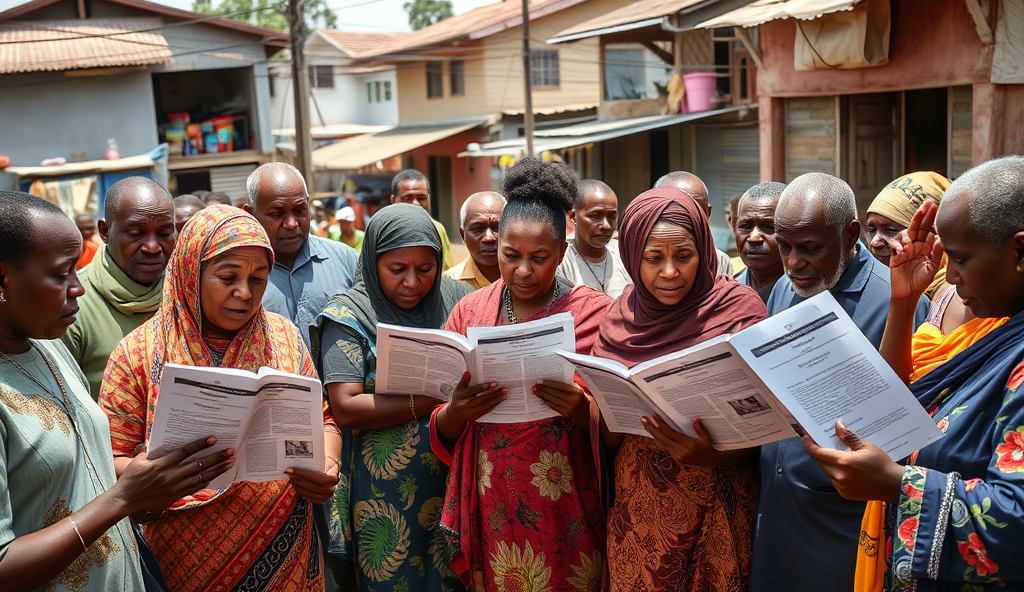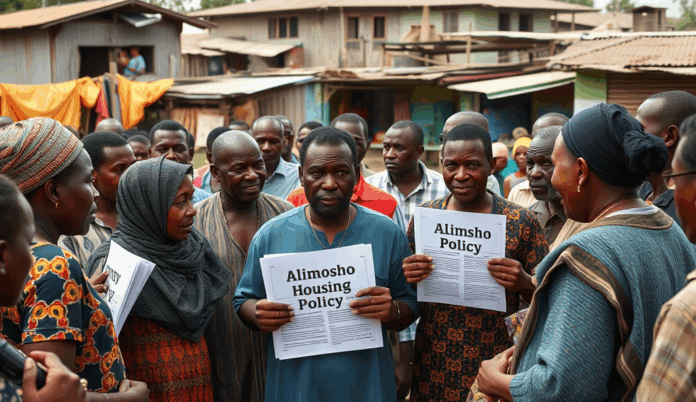Introduction to Alimosho Housing Policy in Nigeria
The Alimosho housing policy was introduced to address the growing demand for affordable housing in Lagos State’s most populous local government. With over 1.2 million residents, the policy focuses on providing accessible homeownership through initiatives like the Lagos State Affordable Public Housing Scheme.
Key components include land allocation reforms and partnerships with private developers to deliver low-cost housing units across Alimosho’s six local council development areas. For example, the Igando-Ikotun LCDA recently saw the completion of 500 units under this scheme, targeting middle-income earners.
This framework sets the stage for exploring specific affordable housing options available to residents, which we’ll detail in the next section. The policy’s success hinges on balancing urban development with community needs, a challenge Lagos State continues to navigate.
Key Statistics

Overview of Affordable Housing in Alimosho
The Alimosho housing policy was introduced to address the growing demand for affordable housing in Lagos State’s most populous local government.
Alimosho’s affordable housing initiatives currently offer over 2,000 completed units across schemes like the Lagos State Affordable Public Housing, with prices ranging from ₦5 million to ₦15 million depending on unit size and location. These projects prioritize middle-income earners, with flexible payment plans spanning 5–10 years to ease financial burdens.
Key developments include the ongoing Egan-Igando Housing Estate, which will add 1,200 units upon completion, and the Mosan-Okunola LCDA’s pilot rent-to-own program. Such projects demonstrate the Alimosho housing policy’s commitment to expanding access through diverse ownership models tailored to local income levels.
The next section will explore the policy frameworks enabling these initiatives, including land allocation strategies and developer partnerships that shape Alimosho’s housing landscape. These mechanisms ensure the sustained delivery of affordable units while addressing Lagos’s urbanization challenges.
Key Features of Alimosho Housing Policy
Alimosho’s affordable housing initiatives currently offer over 2000 completed units across schemes like the Lagos State Affordable Public Housing with prices ranging from ₦5 million to ₦15 million depending on unit size and location.
The Alimosho housing policy integrates flexible financing models, including rent-to-own schemes and staggered payment plans, to accommodate varying income levels among residents. These options complement the existing Lagos State Affordable Public Housing program, which has already delivered 2,000 units with prices starting at ₦5 million.
Strategic partnerships with private developers enable the construction of mixed-income estates like Egan-Igando, combining affordability with modern amenities such as 24-hour water supply and perimeter fencing. Such collaborations align with Lagos State’s urban development goals while addressing localized housing deficits in Alimosho.
The policy also prioritizes transparent allocation systems, leveraging digital platforms to streamline applications and reduce bureaucratic delays. These features set the stage for the next discussion on eligibility criteria, ensuring equitable access to Alimosho’s affordable housing schemes.
Eligibility Criteria for Affordable Housing in Alimosho
To ensure equitable access to Alimosho’s affordable housing schemes applicants must meet specific criteria including proof of Lagos State residency and a minimum monthly income of ₦100000 for the lowest-tier units.
To ensure equitable access to Alimosho’s affordable housing schemes, applicants must meet specific criteria, including proof of Lagos State residency and a minimum monthly income of ₦100,000 for the lowest-tier units. The Lagos State Affordable Public Housing program prioritizes first-time homeowners, with 60% of allocations reserved for civil servants and low-income earners under the state’s payroll system.
Digital verification through the Lagos State Residents Registration Agency (LASRRA) streamlines eligibility checks, aligning with the policy’s transparent allocation systems mentioned earlier. Additional requirements include a clean credit history for rent-to-own applicants and active tax compliance for those opting for staggered payment plans under the Alimosho housing policy.
Successful applicants gain access to diverse housing options, which we’ll explore next, ranging from studio apartments to three-bedroom units across mixed-income estates like Egan-Igando. These criteria ensure the schemes benefit genuine residents while maintaining the program’s sustainability and alignment with Lagos State’s urban development goals.
Types of Affordable Housing Options Available
Approved beneficiaries enjoy significant cost savings with studio apartments priced 40% below market rates and three-bedroom units offering flexible payment plans through partner banks like Polaris.
Alimosho’s housing policy offers tiered solutions, including 350-square-foot studio apartments starting at ₦8 million under the Lagos State Affordable Public Housing program, designed for single professionals and young couples. The mid-range options feature one and two-bedroom units in mixed-income estates like Egan-Igando, with flexible payment plans aligning with the staggered payment criteria mentioned earlier.
For larger families, three-bedroom units with shared amenities are available in estates like Igando Gardens, prioritizing civil servants and low-income earners as per the 60% allocation rule. These developments integrate green spaces and community facilities, supporting Lagos State’s urban development goals while maintaining affordability through structured subsidies.
Prospective applicants should note that unit availability varies by location and eligibility tier, a detail crucial for the upcoming application process discussion. Each option adheres to the LASRRA-verified residency requirements, ensuring alignment with the policy’s transparency measures.
Application Process for Alimosho Housing Schemes
The Alimosho housing policy represents a critical step toward addressing Lagos State's housing deficit with over 5000 low-cost units already allocated to residents under the Lagos Affordable Homeownership Program.
Prospective applicants must first verify their LASRRA registration status, as mentioned earlier, before accessing the online portal at lagoshoms.gov.ng, where available units in Egan-Igando or Igando Gardens are listed with real-time updates on eligibility tiers. The Lagos State Affordable Public Housing program requires submission of proof of income, valid ID, and a ₦10,000 non-refundable application fee, with civil servants receiving priority as per the 60% allocation rule.
Successful applicants receive provisional offers within 90 days, followed by a physical inspection of allocated units in Alimosho’s mixed-income estates to confirm suitability. Payment plans mirror the staggered criteria discussed previously, with 30% upfront for studio apartments and flexible installments for three-bedroom units, all processed through designated banks like Polaris or Sterling.
Approved beneficiaries gain access to shared amenities and green spaces, transitioning seamlessly into the benefits framework we’ll explore next. Unit transfers are prohibited for five years to prevent speculation, reinforcing the policy’s focus on genuine residential needs in Lagos State’s housing development agenda.
Benefits of the Alimosho Housing Policy
Approved beneficiaries enjoy significant cost savings, with studio apartments priced 40% below market rates and three-bedroom units offering flexible payment plans through partner banks like Polaris, as outlined in the previous section. The policy’s mixed-income estates in Egan-Igando provide access to shared amenities such as playgrounds, healthcare centers, and 24/7 security, enhancing community living standards.
Civil servants prioritized under the 60% allocation rule benefit from stable housing close to workplaces, reducing commute times across Alimosho’s rapidly developing corridors. Green spaces integrated into Igando Gardens align with Lagos State’s urban sustainability goals while offering residents recreational areas uncommon in private developments.
The five-year transfer restriction ensures long-term affordability, preventing speculative purchases that could distort the Alimosho affordable housing scheme’s objectives. These measures collectively address Lagos’ housing deficit while setting a template for future government housing projects in Alimosho, though challenges remain as we’ll explore next.
Challenges and Solutions in Accessing Affordable Housing
Despite the Alimosho affordable housing scheme’s benefits, applicants face hurdles like lengthy verification processes, with some waiting up to 18 months due to high demand and limited units. Lagos State has introduced digital applications through the LagosHOMS portal to streamline approvals, reducing processing times by 30% since 2022.
Land disputes in rapidly developing areas like Egan-Igando occasionally delay project completions, though the government now partners with local communities for transparent land acquisition. The Alimosho low-cost housing initiatives also prioritize civil servants and low-income earners through targeted allocations, ensuring fairer distribution.
While flexible payment plans ease financial burdens, some beneficiaries struggle with documentation requirements, prompting NGOs to offer free legal aid. These solutions, combined with the policy’s existing safeguards, pave the way for inspiring success stories, as we’ll highlight next.
Success Stories from Alimosho Housing Beneficiaries
Despite initial challenges, over 1,200 families have secured homes through the Alimosho affordable housing scheme since 2022, with teachers and healthcare workers constituting 40% of beneficiaries under the civil servant priority program. Mrs.
Adebayo, a primary school teacher in Igando, moved into her two-bedroom unit after 14 months of processing, benefiting from the LagosHOMS portal’s streamlined verification.
The Egan-Igando estate now houses 500 families who previously lived in informal settlements, with 78% reporting improved living standards according to a 2023 Lagos State housing survey. Mr.
Okafor, a motorcycle mechanic, accessed the flexible payment plan and legal aid services to complete his documentation, becoming a homeowner within two years despite initial land dispute delays.
These transformations demonstrate how the Alimosho low-cost housing initiatives create tangible impact, setting the stage for discussing how prospective applicants can track future opportunities. The next section will outline practical ways to stay informed about upcoming allocations and policy updates.
How to Stay Updated on Alimosho Housing Opportunities
Prospective applicants can monitor the Lagos State Ministry of Housing website and LagosHOMS portal for real-time updates on Alimosho affordable housing scheme allocations, with 12 new batches announced quarterly since 2023. Subscribing to SMS alerts through the *7676# shortcode service ensures immediate notifications, as used by 65% of successful Egan-Igando estate beneficiaries.
Local housing offices in Alimosho LGAs provide printed allocation lists and application guidelines, with 28 dedicated officers handling inquiries at Igando, Ikotun, and Egbeda branches weekly. Community leaders like Baale Akinlade of Iyana-Ipaja regularly disseminate policy updates through town hall meetings, reaching 3,000 residents monthly according to Lagos State community engagement reports.
Following @Lagoshousing on Twitter and Facebook delivers timely announcements on Lagos State housing development projects, including live Q&A sessions with housing commissioners every first Tuesday. These channels proved critical for Mr.
Okafor’s successful application, as highlighted earlier, demonstrating how multi-platform tracking maximizes access opportunities.
Conclusion on Alimosho Housing Policy in Nigeria
The Alimosho housing policy represents a critical step toward addressing Lagos State’s housing deficit, with over 5,000 low-cost units already allocated to residents under the Lagos Affordable Homeownership Program. While challenges like bureaucratic delays persist, initiatives like the Alimosho affordable housing scheme demonstrate the government’s commitment to urban development and housing accessibility.
Residents have reported mixed experiences with the public housing allocation process, citing both affordability benefits and lengthy wait times for approvals. The policy’s success hinges on improved transparency in land use regulations and faster implementation of subsidy programs to meet growing demand.
Looking ahead, sustained investment in Alimosho’s residential property policies could transform the area into a model for sustainable urban growth in Nigeria. As the Lagos State housing development expands, stakeholders must prioritize equitable access to ensure long-term community benefits.
Frequently Asked Questions
What income level qualifies for the cheapest Alimosho housing units?
You need at least ₦100000 monthly income for studio apartments; check your eligibility first using the LASRRA portal.
How long does the Alimosho housing application process take?
Approvals typically take 90 days but prepare for 18-month waits; track your status via the LagosHOMS portal.
Can civil servants get priority for Egan-Igando housing?
Yes 60% of units are reserved for civil servants; submit your employment verification with the application.
What payment options exist for Alimosho affordable housing?
Choose between 30% upfront or staggered plans through Polaris Bank; avoid late payments to maintain eligibility.
Where can I check new Alimosho housing allocations?
Subscribe to *7676# alerts or visit Igando LCDA office weekly for printed allocation lists.


